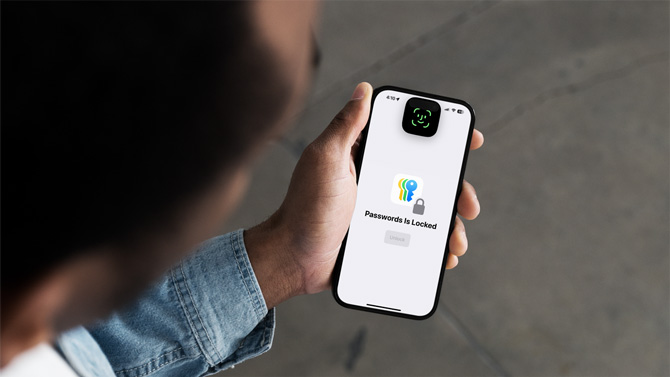With iOS 18, Apple introduced a standalone Passwords app designed to make managing your passwords more intuitive. This app isn't replacing iCloud Keychain – it's a new interface for managing the same data. While iCloud Keychain still handles the secure storage and syncing of passwords across devices, the Passwords app gives you a more streamlined way to access and manage that information. So, what are the key improvements, and why should you care?

One of the biggest improvements is how much easier it is to interact with your saved credentials. In the past, iCloud Keychain operated in the background, automatically saving and filling in your passwords, but accessing those passwords manually was a hassle. You had to dig into the settings to find your credentials, making the process less user-friendly.
Now, all of your credentials are readily accessible through a clean and intuitive interface. You can easily search, add, and edit passwords directly in the app, without navigating through multiple settings menus. Plus, when it comes to sharing passwords, the Passwords app makes the process simpler. While iCloud Keychain did allow password sharing with other Apple users, the process required several steps, typically involving iMessage or AirDrop. The new app streamlines this by letting you share specific passwords or create sharing groups for multiple users more efficiently. However, it doesn't let you share with Android or Windows users.
Another key enhancement is the ability to handle two-factor authentication (2FA) codes. Previously, you had to rely on separate authenticator apps like Google Authenticator, but now, you can store and generate these codes directly within the Passwords app. This makes it a more convenient and secure all-in-one solution for managing both your passwords and authentication codes, a feature that iCloud Keychain lacked.
Read more: How to Protect Your Accounts with Two-Factor Authentication
Even with these improvements, there's no pressing reason to switch if you're already using a third-party password manager like 1Password (the password manager I use and recommend). These apps still offer more advanced features that Apple Passwords lacks, such as secure storage for notes, files, and documents. They also provide cross-platform support for Android devices, which Apple Passwords doesn't, and better support for Windows.
The Apple Passwords app also supports passkeys, which replace traditional passwords by relying on your devices to authenticate you using their built-in biometric authentication, like Face ID or Touch ID. When available, I highly recommend switching over to passkeys because they are more secure and can't be stolen through phishing scams. However, until passkeys become compatible with a wider range of devices, from laptops to smart TVs, traditional passwords aren't going away anytime soon.
Read more: Passkeys: Use This Secure and Convenient Alternative to Passwords Now
The Apple Passwords app is a big improvement over iCloud Keychain, offering you a more intuitive interface, better sharing options, and the ability to serve up authenticator codes for 2FA. If you're heavily invested in the Apple ecosystem, it makes managing your passwords and security credentials much easier.
That said, if you're already using a password manager or need one with more advanced features and broader cross-platform support, there's no reason to switch to Apple Passwords. While it's a great tool for simplifying password management within the Apple ecosystem, it doesn't yet match the capabilities of third-party apps.
[Image credit: Screenshot via Techlicious, iPhone mockup via Canva]
For the past 20+ years, Techlicious founder Suzanne Kantra has been exploring and writing about the world’s most exciting and important science and technology issues. Prior to Techlicious, Suzanne was the Technology Editor for Martha Stewart Living Omnimedia and the Senior Technology Editor for Popular Science. Suzanne has been featured on CNN, CBS, and NBC.

















From aidan on May 15, 2025 :: 6:33 am
I disagree
Since this change I no longer get the option to automatically update a change of email to an existing password
I now find myself taxed with having to manually edit passwords in apple’s keychain password app and amend the email address.
I recently closed an email account and found myself having to manually update the email address for EVERY SINGLE saved password account that used that old email address - nightmare and that was just for 130 passwords
So I disagree when I use safari and update an email address it should still offer the option to update these details with existing saved passwords.
It had led me to think I need to stop saving passwords with Apple in future and use fuck fuck how- they save and still offer to update password email changed like Apple safari used to.
I hardly use safari jow. I find DDG much more simpler to use and more convenient- losing faith in Apple lately - even my AirPods are often losing connection and no longer automatically link up that resulted in going back to using my old Bose headphones just for convenience and don’t get me started on home pod what waste of money I returned to using an old Bose speaker again gor convenience- I dd died I won’t upgrade anymore products as service and connectivity issues have hone down the pan with Apple
…imo… must be outsourcing to save money and that is imo at the expense of customers as we end up with inferior services as a result yet still pay higher prices from a company that I once considered to be a top notch provider ..l15 years they’ve dropped the ball lately - RIP Steve Jobs he knew what quality and high end services stood for… it’s been a spiral not for the better ever since he sadly left this plane of existence
Reply
From aidan on May 15, 2025 :: 6:42 am
Sorry just saw the error…
It had led me to think I need to stop saving passwords with Apple in future and use xxx xxx how- they save and still offer to update password email changed like Apple safari used to.
Should have said…
Duck Duck Go - DDG not xxxx xxxx how
It had led me to think I need to stop saving passwords with Apple in future and use (… Duck Duck Go ) they save and still offer to update password email changed like Apple safari used to.
my fault didn’t proof read
Reply